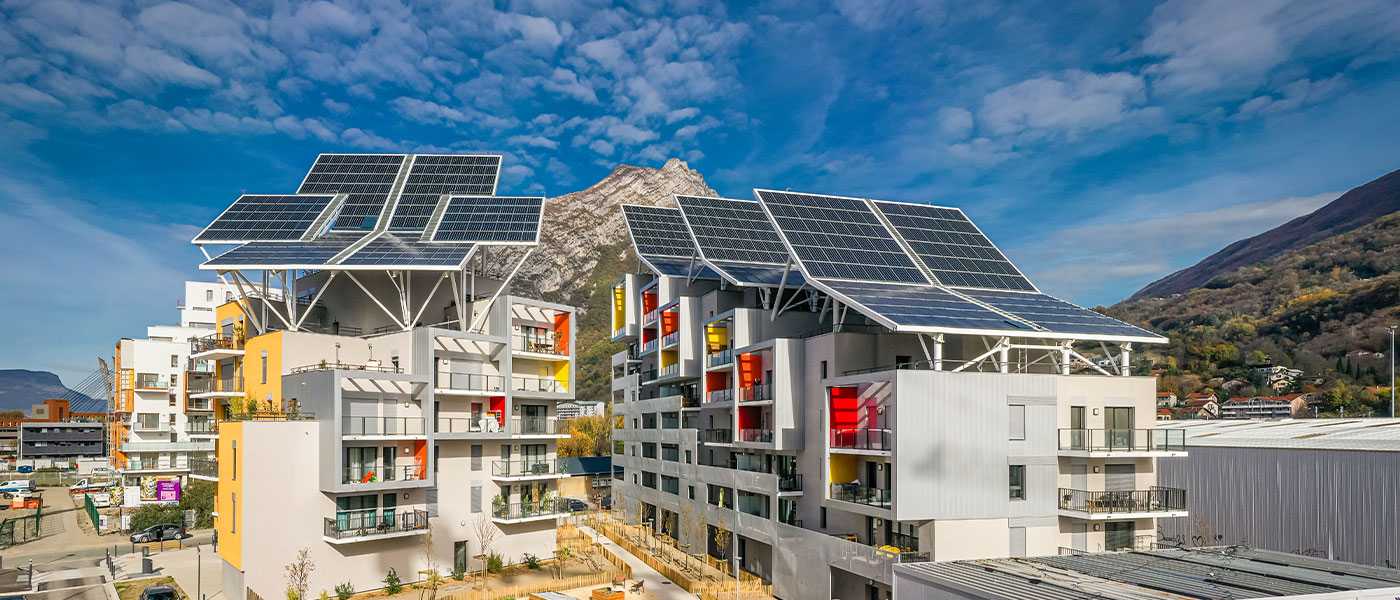
Bouygues plays a major role in decarbonising the building and civil works sector, responsible for around 30% of global greenhouse gas emissions. The Group focuses on a low-carbon strategy: by boosting innovation in-house and with its suppliers, by continuing to reshape its business models and by helping its customers to reduce their own carbon footprints. It was with this in mind that the Group’s business segments signed the EcoWatt charter whose aim is a 10% reduction in the Group’s energy use in France by 2024 versus 2019.
10%
REDUCTION IN ENERGY USE BY 2024

BOUYGUES CONSTRUCTION
Bouygues Construction has incorporated its Climate strategy into its new strategic plan. Its GHG emissions reduction targets are still in the process of being endorsed by SBTi. The roll-out of its “Agir pour le Climat” in-house training programme continues, with 43% of employees now already trained (the target is 100% by 2023).
BOUYGUES CONSTRUCTION AIMS TO :
- Make the transition to a low-carbon economy a major growth driver and generate business growth opportunities by offering its customers distinctive high value-added products and services to minimise the carbon impact across the entire value chain;
- Be a pioneer in the integration of solutions for the production, storage and distribution of decarbonised energy (solar, nuclear hydrogen, etc.), and for the energy efficiency of buildings, neighbourhoods, towns and cities (positive-energy buildings, “zero-carbon” neighbourhoods, etc.), and to support the development of low-carbon mobility (electric mobility, rail infrastructure, etc.);
- Reduce direct and indirect emissions by 2030 compared to 2019 (-40% in absolute terms on scopes 1 and 2 as well as -30% and -20% on scope 3 in the Building and in the Civil works activities respectfully);
- Offer solutions to its customers that allow them to address the challenges of the ecological transition;
- Pursue the roll-out of eco-design methods that use bio-based materials, timber construction techniques with WeWood, R&D on low-carbon concrete, recycling and reuse of materials with the Cynéo platform, significant reductions in construction site waste and improved energy efficiency.
BOUYGUES CONSTRUCTION’S INITIATIVES :
- Reduce the carbon intensity of its projects over their entire life-cycle by focusing on design, building methods (timber construction, etc.), purchasing, particularly on priority packages such as concrete, steel, façades and external joinery, and on the energy use of sites and worksites;
- Implement tools for managing decarbonisation targets that align the climate roadmap with business plans (overhauling of management cycles, integration of tools for evaluating the carbon footprint of projects in the commercial, engineering or works phases);
- Launch Cynéo, a platform that is intended to build a community of repurposed material providers focused around technical centres, and to massively scale up the application of circular economy principles in the construction sector;
- Roll-out new products and services based on alternative materials to support the decarbonisation strategy;
- Green vehicle fleets and increase the proportion of renewable energy use;
- Train staff to be more aware about climate issues. Over 12,000 employees have already received such training, equivalent to 43% of Bouygues Construction’s clerical, technical and supervisory staff and senior staff. The aim is for all employees in these categories to have followed this course by end-2023.
400
GREEN VEHICLES IN BOUYGUES CONSTRUCTION’S FLEET BY 2030
LINKCITY
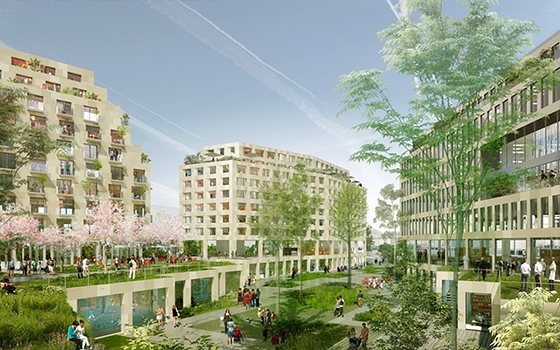
Linkcity achieved fifth place in the 2022 BBCA low-carbon building ranking in recognition of the number of projects awarded the BBCA label.
WeWood : THE ADVANTAGES OF WOOD

Bouygues Bâtiment France aims to have 30% of its projects built using wood by 2030.
BYSPRONG
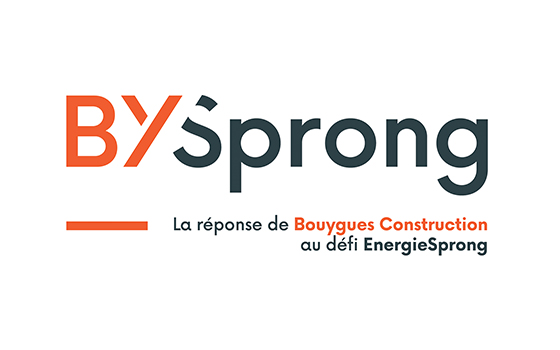
Bouygues Construction has developed BYSprong, a solution for massively scaling up the high-quality energy renovation of buildings while reducing costs through large-scale roll-out.
SUPER LOW ENERGY, SINGAPOUR
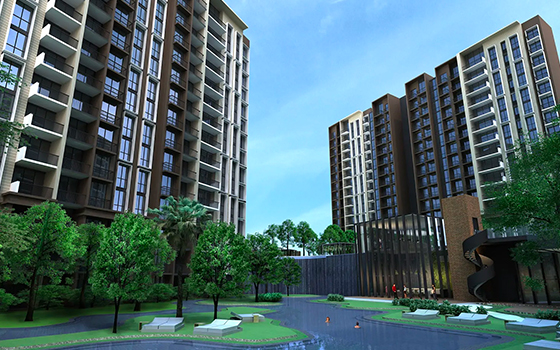
Dragages Singapore (Bouygues Construction) is putting the finishing touches to the BCA Academy project in Singapore. This new training centre for the Singapore government’s new building and construction authority will be a laboratory for testing and developing low-carbon solutions. The project includes two buildings, 7 and 16 storeys high, with very low energy use. While the structure of a Zero Energy building is timber, the Super Low Energy building is made entirely with precast concrete elements from Dragages Singapore factories in Singapore and Malaysia which are then assembled on-site.
ARCHISOBRE
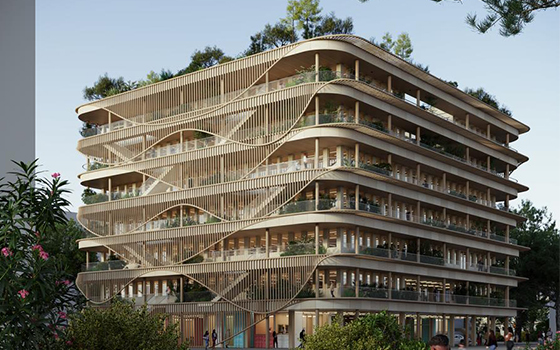
Bouygues Construction has developed the Archisobre building concept, the result of an unprecedented initiative to steer construction towards a very low-carbon future, and thus reduce the carbon impact of commercial properties by a factor of three. The concept is 40% below the targets of the RE2031 thermal regulation.
MODULAR CLASSROOMS
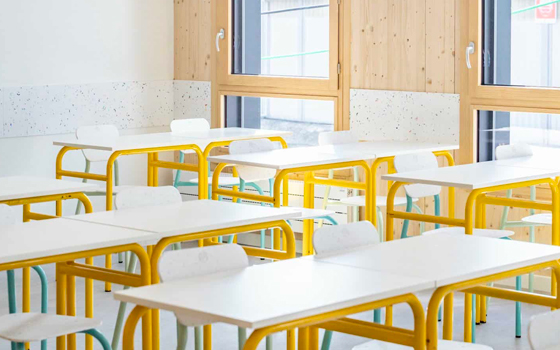
After a year of research and development, Bouygues Bâtiment Ile-de-France, supported by its experts working for the WeWood brand and in partnership with TH, has launched an unprecedented solution for modular classrooms made from bio-based materials.
OFFSHORE WIND FARM , fécamp
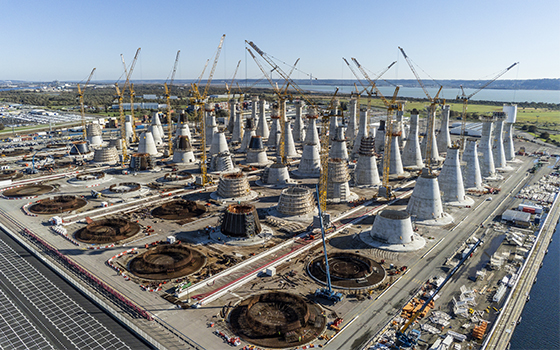
Bouygues Travaux Publics, in partnership with Saipem and Boskalis, is building the foundations for the 71 wind turbines of the future Fécamp offshore wind farm. With its total output of around 500 MW, this offshore wind farm will produce the equivalent of the domestic electric power consumption of around 770,000 people, or over 60% of the population of France’s Seine Maritime administrative department.

COLAS
For 2030, Colas has set a target of a 30% reduction in its direct greenhouse gas emissions (scopes 1 and 2) and of a 30% reduction in its upstream indirect emissions (scope 3a) versus 2019, the reference year, in order to address its large carbon footprint. These targets were endorsed by the Science Based Targets (SBTi) initiative in 2021.
COLAS IS ROLLING OUT ITS CLIMATE STRATEGY THROUGH ITS “ACT” PROJECT IN SIX AREAS:
- Integrate climate challenges into the corporate strategy: new business activities based on offerings that exploit renewable energy sources (e.g. wind farms), the creation of concepts that will help customers adapt to climate change (e.g. ‘green tracks’ for tram lines).
- Improve energy efficiency in order to cut greenhouse gas emissions generated by direct energy use;
- Develop and promote low-carbon products, techniques and solutions (purchasing of low-carbon cement and binders, production of low-carbon concrete, bio-based materials, warm and cold asphalt mixes, in-place recycling);
- Make the carbon accounting of activities more reliable;
- Contribute to carbon neutrality and to the reduction of greenhouse gas emissions generated by customers and users;
- Factor issues related to biodiversity preservation into our business operations
COLAS’ INITIATIVES :
- Reduce direct emissions from plant and industrial activities by switching to decarbonised energy (biogas, green hydrogen, electricity) and to alternative modes of transport;
- Reduce the carbon intensity of products and materials by increasing the share of low-carbon binders for roads, by producing warm, semi-warm and cold asphalt mixes and by developing low-carbon concrete;
- Reduce the greenhouse gas emissions of customers and users by rolling out solutions for the planning and regulation of traffic flows;
- Offer solutions that adapt to climate change (ecological engineering, urban cool islands, urban surfaces that increase permeability, etc.)
- Raise awareness and train employees (e.g. E-learning about carbon footprints and the “La Fresque du Climat” and “Low Carbon Way” workshops that were created in-house);
- To limit the environmental impact from the construction of its projects, Colas offers its customers eco-friendly alternatives, which are alternative solutions to the standard offering that generate savings in materials or transport and use less energy or generate lower greenhouse gas emissions than the standard technical solution. Colas has been using Seve®, the eco-comparison software tool developed by the industry in France, for many years. It has been available in English since 2022, and Colas is rolling it out internationally, particularly in the UK and Canada.
- The introduction of a new methodology for calculating its carbon footprint based on physical flows and on expenditure data contained in its accounting systems.
In 2022, Colas France and Colas Belgium signed a contract for the supply of green electricity covering 100% of their needs. Also, the first calls for tender in France to include CO2 emissions criteria, particularly for hydraulic binders and ready-mix concrete, have also made an appearance. For example, in France, in 2022, on the western section of the T3 tram line project in the Paris region belonging to the Paris transport authority (RATP), Colas Rail, with the help of its suppliers, implemented low-carbon solutions mainly to reduce the carbon footprint of the concrete foundations and the track bed.
160
PLATFORMS IN THE NEW VALORMAT NETWORK, WHICH RECYCLES CONSTRUCTION WASTE FROM WORKSITES INTO AGGREGATES
325
proposals made using eco-comparison software, compared with 198 in 2021
5 878
employees around the world had been trained by the 130 in-house trainers since the launch of the “Fresque du Climat” climate workshops in September 2021, and up to the end of 2022
7 261
tonnes of GHG emissions avoided thanks to the eco-friendly alternatives selected (compared with 4,555 tonnes in 2021)
Vegecol,
THE BIO-BASED ROAD BINDER
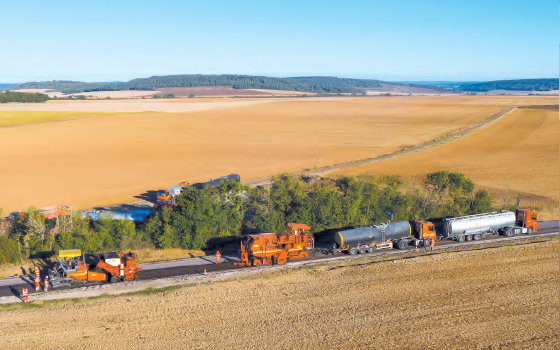
Vegecol binder was used on a 2.2-km stretch of cycle path in Pierrefonds, northern France, in the summer of 2022. Vegecol is a light-coloured asphalt mix made with an innovative binder that is 80% plant-based.
Novacol,
RECYCLES ROADS
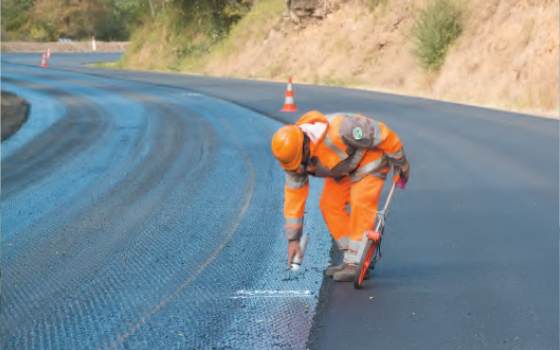
Colas also markets circular economy solutions that save on transport and materials, such as Recycol and Easycold. Recycol in-place recycling was rolled out in 2022 in a number of countries, including in the UK for the renovation of road surfaces in Coventry. The use of such in-place recycling solutions is also very popular in Canada at Colas’ Miller subsidiary.
PHOTOVOLTAIC
WATTWAY, JAPON
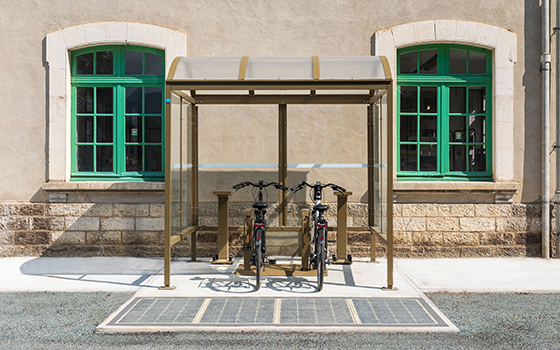
Commercial launch of the Wattway photovoltaic road surface in Japan.
SAIPOL,
PARTNERSHIP
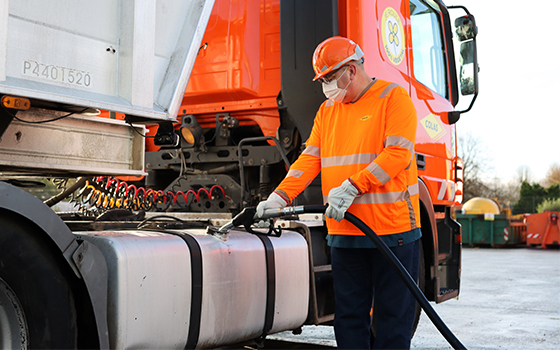
Launch of the partnership signed with Saipol to supply Colas’ fleet of trucks in France with Oleo100, a bio-based fuel.
VALORMAT ET ECOTRI
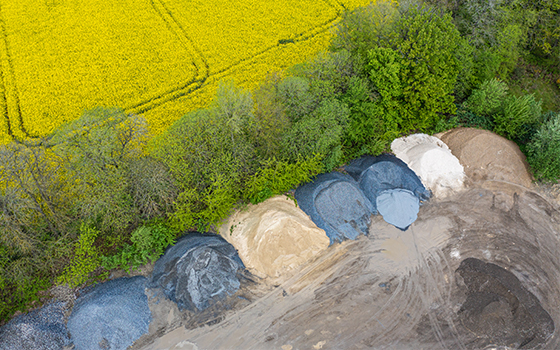
Launch of the Valormat and Ecotri platforms, which aim to increase Colas’ production of recycled materials by 50% by 2026.
START-UP PARKKI
PARTNERSHIP
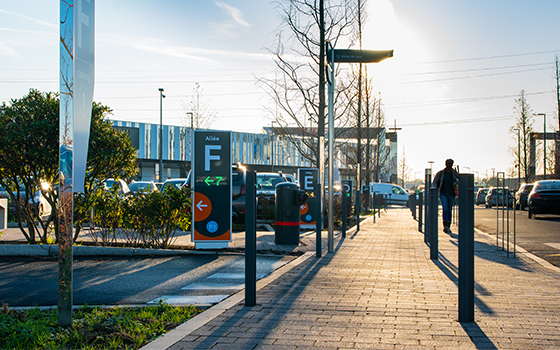
Signing of a partnership with the start-up Parkki to develop smart mobility solutions.
Urbalith
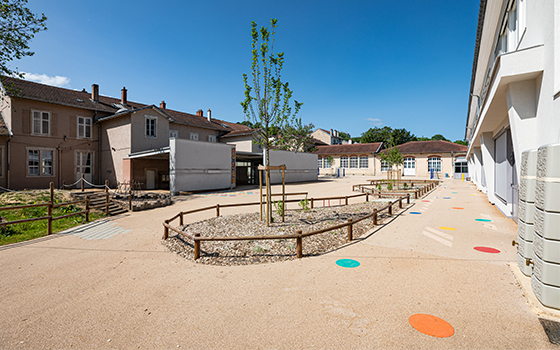
Urbalith is a range of permeable, natural and recyclable pavements. It is designed to comply with specifications for a lower impact on people and the environment. Urbalith’s compliance with these specifications – which comprise 14 different criteria – is periodically checked by an independent body: the French National Institute for Industrial Environment and Risks (Ineris).

BOUYGUES IMMOBILIER
Climate change and biodiversity loss are fundamentally changing the way we live in urban environments. At a time when we need to adapt our lifestyles, Bouygues Immobilier, through its business activities, which are fundamentally people-focused, intends to reduce its carbon footprint through low-carbon construction, renovation and refurbishment, while preparing the ground for demographic challenges and societal changes by making buildings reversible and modular.
This is why Bouygues Immobilier is aiming for a 42% reduction in its greenhouse gas emissions in Scopes 1 and 2, as well as a 28.1% reduction in its greenhouse gas emissions in Scope 3 (upstream and downstream), by 2030 compared with 2020. To this end, Bouygues Immobilier is applying this objective to its various business lines, by reducing the carbon footprint of its residential and commercial property developments and helping to reduce the carbon footprint of residents by developing sustainable neighbourhoods while helping to adapt urban environments to climate change.
BOUYGUES IMMOBILIER’S INITIATIVES :
- Use new building methods and improve the energy efficiency of buildings;
- Promote the circular economy by massively reusing materials on projects, encouraging the rehabilitation and reconversion of buildings, and focusing on the demountability and reversibility of materials;
- Improve intensity and quality of use, through shared living spaces, reversible buildings and common areas. Nomo, a new brand focused on coliving, has been launched. This is a shared housing offer that meets the new uses and needs of young working people and addresses environmental issues, particularly through the use of modular construction.
- Design neighbourhoods via UrbanEra that encourage users to adopt virtuous behaviour (a 40% reduction in the carbon footprint of residents by cutting emissions linked to housing and mobility)
- Adapt to climate change in urban environments and restore carbon sinks at the local level;
- Develop socially-responsible business partnerships that prioritise tangible actions (Hoffmann Green Cement, Ecocem, CCB Green Tech, Algo, Saint Gobain Glass France);
- Launch new offerings such as “Cœur de vie”, the new integrated approach to housing for more sustainable, comfortable and modular projects, Loji, Bureaux généreux (100% of office projects awarded an environmental label since 2022), Nouveau Siècle, a subsidiary specialising in the rehabilitation of listed buildings and sites and Jardins de Noé;
- Train all employees in the low-carbon approach (95% of employees trained since May 2021).
28%
REDUCTION IN ITS CARBON EMISSIONS
BY 2030
1 100kg
IS THE AVERAGE CARBON FOOTPRINT OF EACH SQUARE METRE OF LIVING SPACE OVER 50 YEARS FOR CONSTRUCTION AND OPERATION
90%
Of our product suppliers are covered by a framework contract in the France Residential property division, and assessed via the Ecovadis platform
5%
By 2030 is the target for the reuse and recycling of materials in Bouygues Immobilier projects. 500 housing units a year will be created by converting office space by 2025
EN SAVOIR UN PEU PLUS :
- Bouygues Immobilier signs the Ecowatt charter.
- Introduction of the “BBCA Quartier” label at SIBCA. This label certifies that an entire neighbourhood has an exemplary carbon footprint. UrbanEra’s aim is to reduce the carbon footprint of the residents of Bouygues Immobilier neighbourhoods by 40% between 2020 and 2030.
- Bouygues Immobilier is ranked in the Top 3 of the 2022 BBCA ranking of project owners for the number of low-carbon projects undertaken and completed in 2022 and since 2016.
- Bouygues Immobilier is one of 150 companies contributing to the roadmap towards the decarbonisation of society via the Convention des Entreprises pour le Climat (CEC).
- Bouygues Immobilier is one of the members managing and coordinating the Hub of low-carbon prescribers (supported by the IFPEB).
Hôtel des Postes de Strasbourg
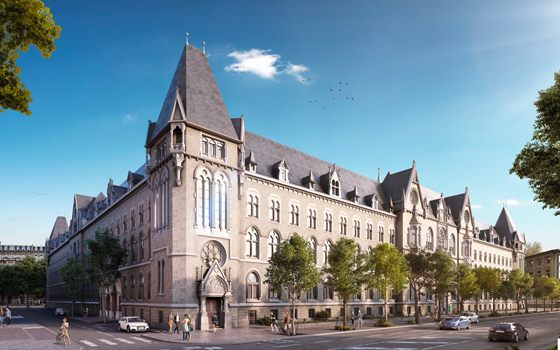
At the “Hôtel des Postes” project in Strasbourg, Bouygues Immobilier reused structural components, internal doors and various other parts of the building, and employed innovative ideas such as repurposing the old carpet as insulation.
The renovation of this building avoided the emission of almost 7,100 tonnes of CO2, compared with a new build project of the same size, thanks to the use circular economy methods and low-carbon concrete.
QUARTIER GARE, GENEVOIS (74)
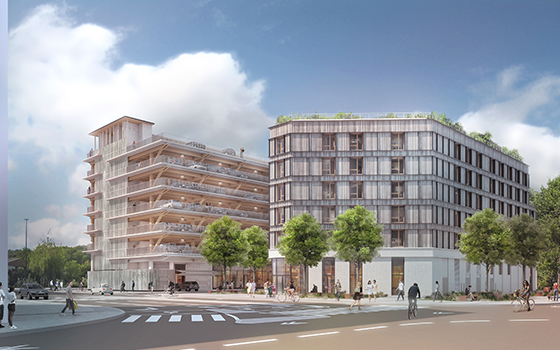
This project is being developed around a multi-modal transport hub. It features a comprehensive mobility programme, with preference being given to public transport and configurations that encourage pedestrian usage. Cycle lanes will also be provided.
SWAYS, ISSY LES MOULINEAUX (92)
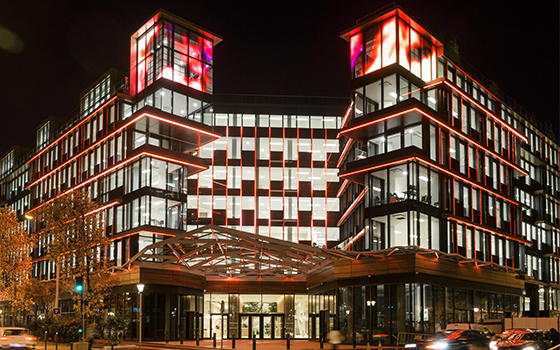
It has a HQE (High Environmental Quality) certification at the “Exceptional” level and many of its components are made from reused materials, such as the false ceilings, raised floors and water heaters.
Loji
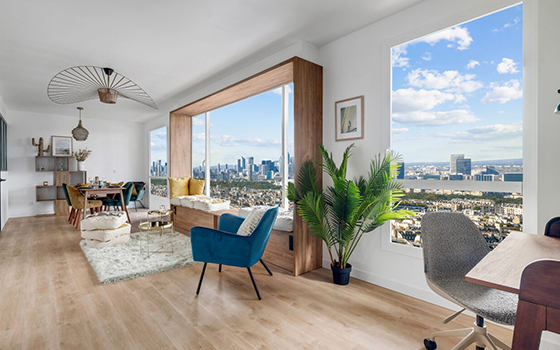
Loji spaces are compatible with the RE2020 thermal regulation (a 49% reduction in CO2 emissions according to Carbone 4).
isiere en seine, rouen (76)
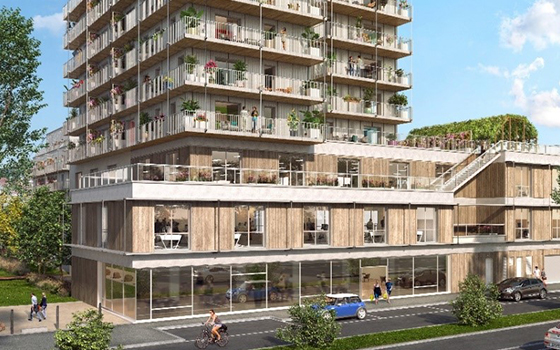
Two Pyramides d’argent awards. The only project in France included in the European “Future Cities” programme with an E3 C2 energy performance rating, this apartment complex features a geothermal heating system, photovoltaic panels and bio-based building materials.
Coeur de vie
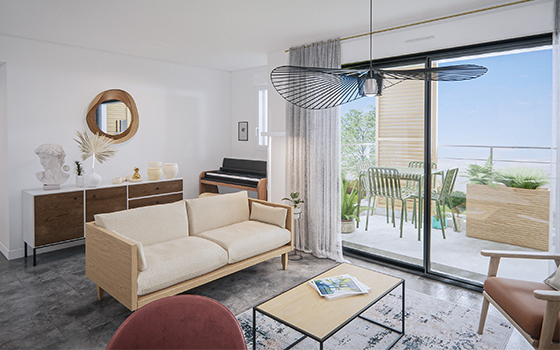
A new housing offering from Bouygues Immobilier designed to drastically reduce its environment impact. As of 2022 its projects are continuing to take further steps towards decarbonisation through a mix of low-carbon materials such as wood, bio-based materials, concrete, and recycled products. Furthermore, Bouygues Immobilier prefers to use concrete with a lower carbon footprint or decarbonised concrete without clinker.